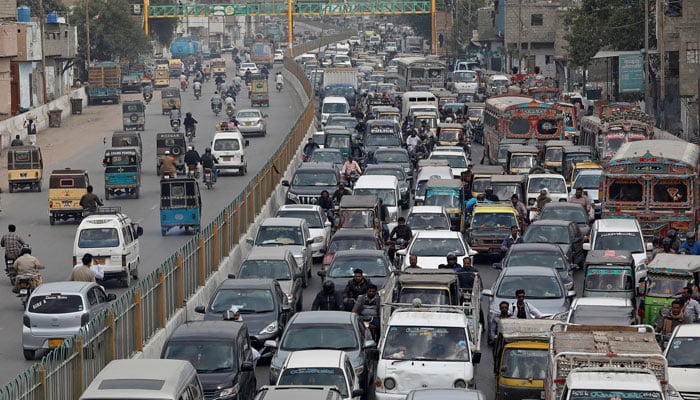Blog: Decaying public transport system exacts a heavy toll on Karachiites
February 22, 2020

Daily commutes are stressful, especially when one has to travel long hours moving to and from home.
Studies indicate that transportation-related worry can take a heavy toll on a person’s health, leading to high blood pressure and anxiety, among other illnesses.
These health issues then result in increased medical bills, and in turn render the low- and middle-income working class more vulnerable to economic instability.
In other words, long commutes may be killing you.
A 2018 study conducted by the World Bank, titled Transforming Karachi into a Livable and Competitive Megacity: A City Diagnostic and Transformation Strategy states that every day, an estimated 45 people compete for a single seat on a bus in the city, compared to 12 in Mumbai, India.
“Limited access to transit options affects women in particular,” the report adds, “Karachi’s transport problems cannot be resolved by simply investing in more infrastructure and facilities; the solution lies in a comprehensive strategy and efficient institutions.”
For men and women who work over 40 hours per week, the pressure of grabbing a seat every day can send stress levels soaring. This forces the salaried class to spend more and more on trips to doctors, pushing them further down the economic and social ladder.
Public transport for the few
A 2012 study by the Tokyo-based Japan International Cooperation Agency (JICA) revealed that 42% of the population of Karachi is catered to by only 5% of the transportation on the roads. Other transport modes include motorcycles, rickshaws and taxis.
This fact was due to the huge disparity in the share of the different modes of transport that are found in Karachi. The disparity leads to the overburdening of buses in terms of the volume of passengers.
“Since the number of registered buses and minibuses is approximately 21,800, a bus carries 257 passengers per day,” the 2012 report stated, “Since buses are operated by individual operators who want to maximize the fare revenue, overloading, including roof-top seating, waiting for passengers at a bus stop for a long time…are commonly observed.”
Public and private buses, it further adds, are “unpredictable, unstable and uncomfortable”.
The preference for motorized transport can be explained by considering the huge sprawl of Karachi and the population density of the city center.
Moreover, adding to the misery of the already stressed workers, is the frequency of city-wide strikes by transport operators, and the uptick in fuel prices. Coupled, these two issues make competition for a single seat on public transport tougher than it already is.
The health cost of public transport
The struggle to commute daily in Karachi is not only denting one’s wallet, but has many health implications which go unnoticed.
Dr. Adeeb Rizvi, founder of the Sindh Institute of Urology and Transplantation, told Geo.tv in 2018 that if diabetes and high blood pressure go untreated, the people of Karachi may witness a spike in kidney-related diseases.
Since a large chunk of the worker’s salary goes towards healthcare in such a case, it restricts his/her upward mobility. Simply put, an uneven infrastructure and lack of public transportation is keeping many Karachi residents poor.
Another concern, more recently, is the over-exhaustion of roads. Fed up with bad public transit options, more people in the city are buying cars. Furthermore, in the last few years, ride-hailing services such as Uber and Careem have also entered the local market. This has only increased traffic congestion.
Privately owned transport, which commutes only about 40 per cent of the city’s workers, makes up 84 per cent of the traffic on the roads, says the survey by JICA done in 2012.
This means more traffic congestion, logjams and accidents if traffic rules are flouted. Disruption in the flow of traffic increases commuting time for people.
Then there are other implications of a traffic mess. As per the United States Agency for International Development in Jordan, 50 per cent employees in the country quit their jobs due to excess competition and the lack of proper transportation.
If Karachi does not address its public transit emergency, it is in for an economic and health crisis. Individuals and households may collectively be pushed below subsistence levels of living, and chances are that they will be pushed below prescribed poverty levels of the United Nations.
The author is a student of public policy.











